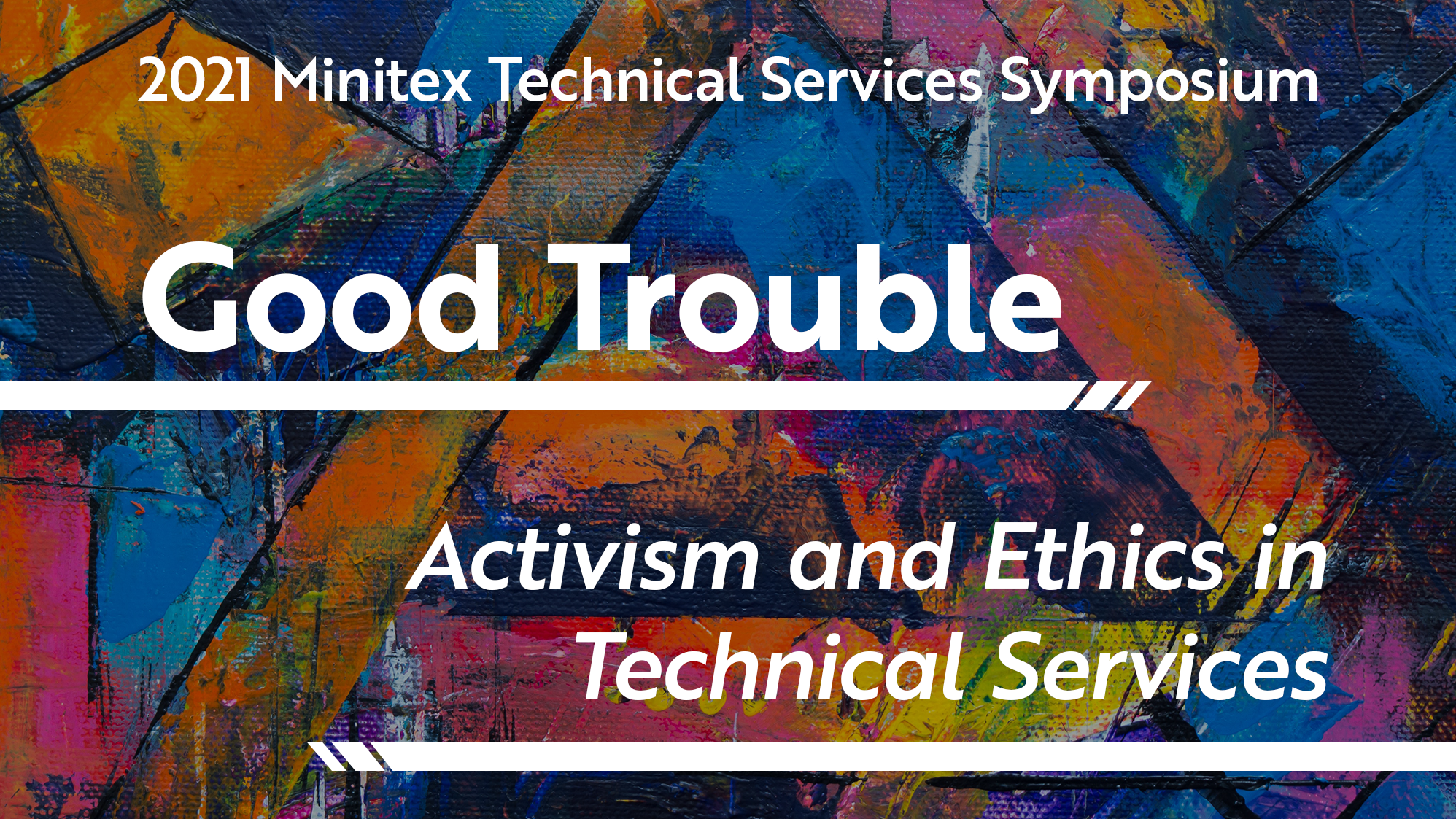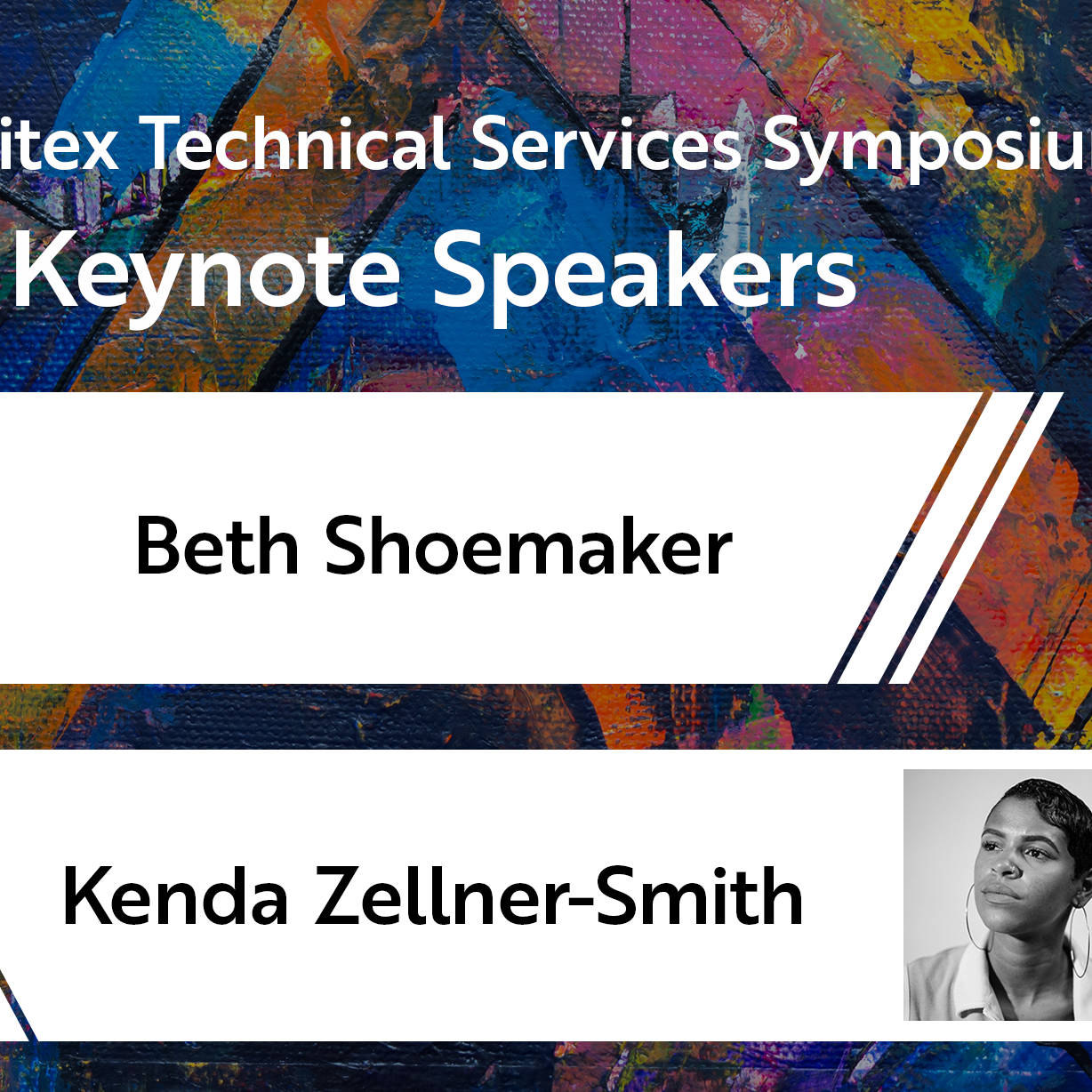by Lizzy Baus
Quick Summary
We are happy to announce the breakout sessions for the 2021 Minitex Technical Services Symposium, Good Trouble: Activism and Ethics in Technical Services. Along with two keynote presentations, we have a full program of six additional sessions on wide-ranging technical services topics, from the impact of empathy to specific how-tos, and plenty in between. Read on below to learn more about these sessions, and then go to the event page to register now!

We are happy to announce the breakout sessions for the 2021 Minitex Technical Services Symposium, Good Trouble: Activism and Ethics in Technical Services. Along with two keynote presentations, we have a full program of six additional sessions on wide-ranging technical services topics, from the impact of empathy to specific how-tos, and plenty in between.
Read on below to learn more about these sessions, and then go to the event page to register now!
Recognizing the extraordinary in the ordinary: Ethical co-working in Technical Services
Caterina Reed
Professional librarianship standards, such as the ALA Code of Ethics, embrace values of diversity and accessibility, but these are values often extended to library users. Do we consider accessibility and inclusivity of our colleagues, particularly within Technical Services? This presentation will discuss the negative impacts of a lack of inclusivity and empathy within Technical Services. Strategies in morale-building and how to be a better ally to marginalized colleagues will be provided. The ethical imperative to be an empathetic and respectful colleague will also be discussed. Participants are strongly encouraged to share their own workplace experiences in this safe space.
Easy Ways to Decolonize the Catalog
Bobby Bothmann
This session will look at some small projects that make it easy to begin decolonizing your catalog, from finding classification numbers that recently changed the N Cutter for Negro to B for Blacks/African Americans to methods for updating new and existing records with culturally sensitive vocabularies such as Homosaurus and alternatives for Indigenous peoples.
You’ve Got Accessible Resources: Can Your Users Find Them?
Violet Fox and David Norris
The Library Bill of Rights posits that libraries and their resources should be free and available for all to use. However, are resources truly free if users can’t find them? MARC fields dedicated to more effectively conveying accessibility information (such as those designating large print books and captioned videos) were implemented in 2018, but not many catalogers are using them or even know that they exist! Join us as we talk through options for recording information about accessible resources in your library and discuss strategies for urging vendors to display this vital information.
Using SNAC to Highlight Women's Voices in Archival Description
Libby Hertenstein
My presentation will focus on the beginnings of a project to highlight women's voices from Bowling Green State University's Center for Archival Collections finding aids by using the SNAC (Social networks and archival context) database.
Women's voices are often forgotten in archival description because they may be mentioned in passing in favor of a husband, father, brother, or other family relation, who may be the main focus or creator of the collection. Further, because these women aren't necessarily "authors" they may not be appropriate candidates for Library of Congress Name Authority records leaving them "unknown" in authorities databases, thereby ignoring their often valuable contributions and silencing their roles within collections.
Further topics covered in the presentation will include an introduction to SNAC, a discussion of how to identify under-represented voices in finding aids, how to input information into SNAC, and finally, a discussion on the ethics of adding people to authorities databases who may be living or dead.
From the Back Room to the Front Line: Integrating DEI Primary Sources for Discovery
Faye Mazzia and Ying Zhang
As part of our sustaining commitment to diversity, equity, and inclusion (DEI), the University of Central Florida Libraries has acquired several primary source collections from vendors such as Adam Matthew, Gale, and ProQuest. The content of these collections could greatly support the DEI initiatives and the teaching and research at the University. However, the lack of descriptive titles, metadata inconsistencies across collections, and potentially sensitive terms and material often make it challenging for users to discover the richness of resources.
To promote the awareness of these DEI-focused collections, the Library technical services team is exploring ways to increase exposure and usage of these resources, such as adding more granular bibliographic records at the individual document level to the catalog. This presentation covers strategies that librarians in the technical services are developing to evaluate, select, incorporate, and enhance metadata and bibliographic records to the catalog while considering user experience, metadata, and integration with the institution’s library system.
Demographics of Cataloging and the New White Man's Burden
Preston Salisbury
Librarians in general and catalogers, in particular, have come to realize that the library catalog contains racist, insensitive, and outdated terminology, in addition to being organized in a way that makes it, by default, a white space. Fixing this problem is the responsibility of the current generation of catalogers. However, the demographics of cataloging departments frequently place an undue burden upon catalogers of color, which is already a small minority within the profession.
The solution is to upend the former cultural doctrine of the "White Man's Burden" and to place the burden of inclusive cataloging not on the minority, but on the white majority within the profession. The presenter (a white man himself) will outline steps that white catalogers everywhere can take to make their work more inclusive and anti-racist, as well as provide advocacy for people of color within the profession.

